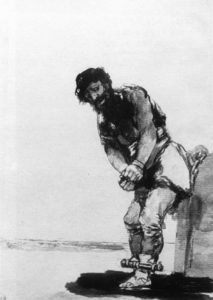Two others, who were criminals, were led away to be put to death with him. Luke 23:32
“Up! It’s your time!”
Their names are unknown to us: One and Two. Left and Right. As we meet them, they’ve known for some time that the day was coming but they weren’t sure when—like all of us.
They’ve lived their lives in a haze, yelling from the very first hour: give me food! Give me warmth! Give me shelter, give me love! Give me that shiny thing, and this tasty thing, and that thrilling thing, and this intoxicating thing that will make me lose consciousness for a while so I’ll forget how unsatisfied I am (like all of us).
Unwilling to make do with that they had, they became thieves; interlopers, snatching bright moments from the dull days, decking their lives with desperate finery. They bargained with the time but time always wins; sooner came before later, and they were caught.
Like all of us.
“Up! It’s your time!”
Pulled from a filthy cell, loaded down with heavy cross-pieces, they are herded like cattle to the Walk of the Damned. Terror blinds them; only gradually do they perceive the splatters of blood on the path before them. And then the crowds: Dear people, is all this acclaim for us? No, couldn’t be: there’s another poor wretch ahead of them, who’s doing all the bleeding and attracting all the noise. And what noise! Wails of sorrow, mocking jeers, furious catcalls packed into a multi-legged clamor, punctuated by stings of a whip applied to make them move faster.
Is there no escape? No way out? They’re moving down a hollow tube with iron walls and no joints—no vulnerable places that can be exploited. Life—once full of possibilities and angles and gaps, pleasure and pain, light and dark—now hardens, funneling them down to a single point they cannot see beyond.
As for all of us.
Down the road, through the gate, up a long, tortuous hill, the splintery crosspiece bearing down with every step. Still, they’d gladly keep walking forever—or even more gladly pull someone from the screeching throng to take their place That scribe over there, his face so buckled you would have thought he was passing bricks, screaming his rage. That smug-looking Pharisee or his grim-faced pal. Any one of the contemptible Romans: illiterate peasants most of them, of no higher birth than a Jewish thief, who nonetheless lord over them every chance they got. Even that wailing woman there, or the wide-eyed boy—pull one of those out of the mob, put this hunk of lumber on their back, and I’ll not protest.
Might feel guilty tomorrow of course, but there will always be another skin of wine and another willing woman to help me forget.
“Halt!”
Not today, though.
Rough hands throw the crosspiece on the ground, drag the two men aside and strip off their clothes. A guard sizes up those pathetic garments with a calculating eye, deciding if he wants to gamble for them. Though they know they’ll soon be beyond it, shame stabs each of the condemned as they stand exposed before the crowd. They’ve been observers at scenes like this, and well know the kind of jokes and jibes passing among the ranks right now.
The crosses are being nailed together. The two thieves, pathetically trying to cover their private parts with unbound hands, become aware of the third condemned man. He too is naked except for a grotesque garnish—a circle of spiky thorns pressed down on his head. The soldiers are calling him King of the Jews. The thorns are supposed to be a crown—their idea of satirical wit. The two thieves realize, at about the same time, who this is: Jesus of Nazareth. They’ve heard of him—who hasn’t? And what Jew, however impious, didn’t harbor some hope, however sketchy, that this was the one: Messiah.
The screaming mob now surrounding Skull Hill must have had the same hope—what else could explain their rage? In the last moment before the hammer falls, when they are seized and stretched out, when extra hands are called to hold down their twitching bodies, they feel it too: absolute rage, consuming fury. Like a child of wrath, foolish, disobedient, malicious, envious, full of hatred for themselves, for others, for God,
Like all of us—
Screams rip the bland blue sky.
_________________________________________________
For the original post in this series, go here.
<Previous
Next>

